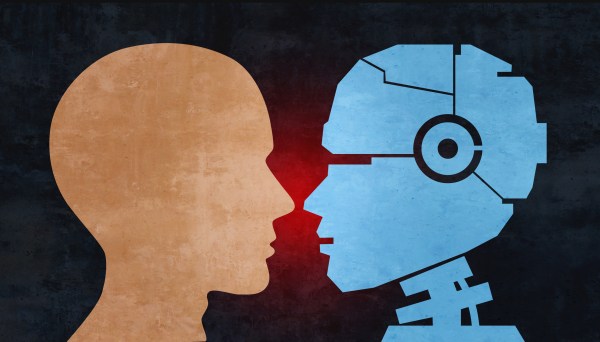When the phonograph was invented, the composer John Phillip Sousa was heartbroken. In a 1906 article on “The Menace of Mechanical Music,” he worried out loud that recording tools would reduce music from a matter of the heart and soul to a mere mechanical process. To us, this sounds ridiculous. It is clear that we have gained a great deal by the advancement of recording technology, which makes available to us a massive variety of beautiful music.
But more specifically, Sousa worried that recorded music would make us less likely to make music ourselves. After all, why, say, learn to play the piano when you could simply press play? For Sousa, half of the beauty in music comes from the personal element of its performance. He concluded his article thusly: “When a mother can turn on the phonograph with the same ease that she applies to the electric light, will she croon her baby to slumber with sweet lullabies, or will the infant be put to sleep by machinery?” In the age of the tablet-clutching child, this ought to hit home.
The point of this illustration is that we are often so thrilled with new technologies that we forget what they might cause us to lose. Neil Postman, the famous media scholar of the latter half of the 20th century, spent a lifetime thinking about these losses and outlined five principles for understanding technological change. The first of these is that technological advance is always, to some extent, a tradeoff. He readily admitted that the advantages of technology might well outweigh any losses involved, but we should pay attention to those losses, in case we accept a technology that takes more from us than it gives.
It’s almost quaint that Sousa was worried about the mechanical reproduction of music, given that we are entering an era of potential loss on a far grander scale, and no one now would think of Spotify in terms of the loss of making music for ourselves. The advent of artificial intelligence comes with a host of potential gains. But it could also rob us of our humanity.
In what follows, I will sketch what it might look like to apply Postman’s principles to AI, to help ensure that we remain masters of our technology, rather than being mastered by it.
- All Technology Is a Tradeoff
I take it that we are all aware of the advantages of AI technology, and we need not rehearse them here. When I write of loss, I am not writing of specific scientific or business applications, but of the use of these tools in ordinary human life.
The most extreme cases can be seen in recent advertisements for Google’s Large Language Model, which sell the tool’s ability to chat with you like you would with a dear friend, and in mental health counseling LLMs, which presume that counseling is simply a series of supportive utterances, rather than a form of interpersonal understanding. These products promise to offer the benefits of relationships, with none of the friction. The AI will not disappoint or betray you; it will not spill your secrets. (Unless, of course, there’s a data breach.) And yet, a chatbot isn’t anyone at all.
In this way, these tools are proposing to rob us of what is most truly and intimately human: personal relationships. Friendship, therapy, and family are not merely about mouthing the right sounds or typing the right words; they’re about being seen by someone, by a person. An expression of sympathy, of love, of joy, of sorrow, without someone who intends expression, is, in a real sense, meaningless. When an AI mimics words of love or affection or advice, there’s no meaning-giving mind behind the words.
But we lose in a thousand other, simpler ways, too. The AI offers us no individuality, no creativity, no genius, it merely scrapes all that has ever been published and gives us the most probable output. In doing so, it pillages all human culture and flattens it into sickly imitation.
At the same time, it threatens our freedom and creativity. We use this tool to make decisions; we use it to prepare for dates, we use it to compose letters to lovers and to grieve family members. Instead of expressing, imperfectly, with difficulty, what is in our heart, we let the machine spin out the same stale words. In vacating our own creativity, we become molded into the likeness of the algorithm, and all human expression threatens to become recursive, meaningless repetition.
Anything human worth having comes through difficulty, all growth comes through challenge, all achievement comes through friction. In attempting to make our life painless, AI tools threaten to take what is most valuable, what is most true of us: our own learning, our ability to overcome difficulty, our creativity and the originality of our encounters with the world.
- The Advantages of Technology Are Distributed Unevenly
As L.M. Sacasas has described ably elsewhere, digital technology keeps us at a distance from the material realities implicated by it. When we use our smartphones, we never think of the Congolese slave who mined the rare minerals that make it run, or the Uyghur forced laborer who put it together in the factory. When we use AI, we don’t see the huge amount of water taken out of the drinking supply to cool the data centers. Global supply chains separate us from realities like this all the time, but digital technology in particular allows us to separate ourselves to an even larger degree from the real environment, in favor of the world inside our devices.
So who wins and who loses with LLMs? Some clear winners are huge corporations. As we turn more and more of our life, our thought, and our expression over to them, we open ourselves to manipulation and to buying more and more of whatever it is they want us to buy. AI tools increase the ability of corporations to target their marketing, to suggest, and prod, and push us toward their products. As the remaining private corners of our lives are colonized by devices that track our words, our questions, our movements, our stray thoughts, we become more and more malleable in front of the companies that hold that data.
- Embedded in Every Technology Is a Powerful Idea
Postman thought that technologies, especially communication technologies, contain biases. They encourage us to think about the world in certain ways. Oral cultures prized memory. Written culture emphasizes structure and logical organization. Telegraphic culture emphasized speed and brevity. Social media emphasizes hasty reactions and immediate popularity..
Perhaps the idea contained in AI is that challenge and inconvenience are ills to be eliminated, rather than the stuff of human flourishing. Perhaps it is the idea that creativity is nothing but new combinations of old patterns. Perhaps it is the idea that human relationships are reducible to simple text-based interactions.
Perhaps the most troubling possibility is the idea that friction in life is a mere obstacle to be overcome, that learning can be had without challenge, that relationships can be had entirely on our own terms.
But it is through tough encounters with the physical world that we gain knowledge about that world. It is through encountering the challenges of social and moral life that we cultivate character. It is through pushback, negotiation, and failure that we come to understand what it is to be a friend, a spouse, a family member. Learning is not about consulting a machine for correct information, it is about developing judgment and the skills involved with reasoning, interpreting, and making sense.
In presenting to us the promise of learning without the development of judgment and memory—both of which are crucial to learning in the first place—in promising us sympathy and counsel absent a human heart, this technology shapes the way we think about the world. Our understanding of things begins to be shaped by the limitations of the tool. And those limitations are serious.
- Technological Change Is Not Additive, It Is Ecological
Postman gives as an example of this fourth point the way in which television changed our political life. TV did not just become one option among many for engaging with politics—it displaced old ways, and not without loss. TV executives were not trying to reduce politics to a circus, to reduce debate to shouting matches, it just happened. TV, as Postman described in his 1985 book Amusing Ourselves to Death, changed the whole ecosystem of how we think and talk about our public life.
For television programming to be successful, it had to be a spectacle. Why do meteorologists have to go stand out in the hurricane to tell us about the weather? Because it’s a spectacle that makes for good TV. Why do congressmen use their hearings to showboat and perform rather than ask those testifying meaningful questions? Better TV. Remember again the cable TV shouting matches. To Postman, this tendency of the medium toward spectacle cheapened our public discourse, made us dumber, and made us angrier. There’s some research to suggest LLMs do something similar; that is, make us less creative and worse at judging things. Postman pointed back to a more literary age, when the media du jour, however imperfect, tended toward relatively calmer, more reasoned, more systematic expression. Of course, there were pamphlets and papers by sensationalists and hacks in those days, but the medium offered fewer opportunities for spectacle, and shaped a relatively slower and more structured form of thinking.
We see already the ways in which AI is shaping our work, our education, our relationships, our daily tasks. But it’s not going to stop there, and we ought to be alive to the ways that these tools will shape us and our culture more deeply, even when we’re not actively using them.
- Media Tend to Become Mythic
What Postman meant by this last idea was that successful new media technologies gain an air of inevitability and start to be understood as “facts of nature.” The trouble with this, Postman said, is that it hampers our ability to control, question, or moderate our technologies.
Once social media came on the scene, it was here to stay. It’s extremely rare to find someone who is completely disconnected from Facebook, Twitter, Instagram, or TikTok. Some of the young students I work with were distraught and experiencing “withdrawal” in the few hours TikTok went down in January. Is this tool, with all the misery it can bring, simply a fact of life?
This kind of thinking can affect lawmakers as well, who might see regulating new tools as a near impossibility because of their vast popularity, technical complexity, and the rate at which technology is developed. But the truth is that we can manage our new tools, if we have the will. Australia’s recent rules around social media use for minors is a sign that this is so.
Postman wanted us to be alive to the fact that, as technologies change, we have the power to decide how they will change us, if we are willing to ask the right questions, make the right choices, and impose the right limits. This is not only true for lawmakers, but for individuals, who can use their freedom to use tools only to the extent that they encourage human flourishing. It is also true for parents and teachers and others in authority, who have the power to go against the flow of the surrounding culture. Postman would want you to feel free not to give your grade school kid a smartphone. It’s not inevitable, he would say. It’s up to you.
All new technology, Postman pleaded, must be recognized not as divinely inspired, but as a product of “human creativity and hubris…its capacity for good and evil rests entirely on our awareness of what it does for us and to us.”
The point is not that there was ever any golden era. Indeed, any technology may—and probably will—be misused. The point is that we ought to be aware of the gains and losses of new tools, and we can be bold enough to ensure that these tools are used in ways that add to our lives more than they subtract. As technologies become more powerful, so too does our ability to do harm with them. (Think of one of the most degrading examples of AI technology: deepfake porn that uses the faces of real women without their consent).
I repeat that I do not blithely dismiss the power of these tools for human good. If a scientist wishes to use AI tools to chart the decay of an ocean reef, so that she knows what can be done to fix it, more power to her. But if these tools are used to take from us our basic modes of expression and relationship, if the great false god of convenience crushes everything sincere and human in its path, then we ought at least to hesitate. Sousa was right when he noted that the value of a mother’s song is not in hitting the right notes. Rather, it is that she sings to her baby.









Please note that we at The Dispatch hold ourselves, our work, and our commenters to a higher standard than other places on the internet. We welcome comments that foster genuine debate or discussion—including comments critical of us or our work—but responses that include ad hominem attacks on fellow Dispatch members or are intended to stoke fear and anger may be moderated.
With your membership, you only have the ability to comment on The Morning Dispatch articles. Consider upgrading to join the conversation everywhere.